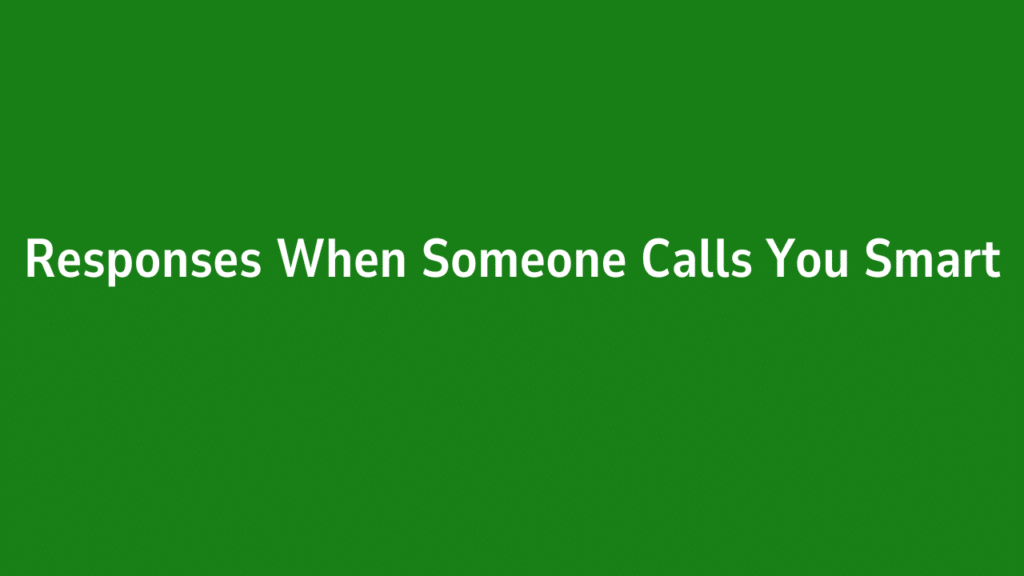Being called “smart” is one of the best compliments anyone can receive. It can make you feel recognized, appreciated, and valued. However, it’s easy to feel unsure about how to respond to such a compliment. Should you downplay it, show humility, or accept it proudly? How you respond can influence how the conversation flows and how others perceive you.
In this blog post, we’ll explore different ways to respond when someone calls you smart, offering a variety of responses that are suitable for different situations. Whether you want to be humble, confident, or even humorous, you’ll find a response that suits your personality and the situation.
Understanding the Compliment
Before diving into the responses, it’s important to understand why being called “smart” is a meaningful compliment. When someone tells you that you are smart, they are recognizing your intellectual abilities, quick thinking, and problem-solving skills. It’s not just about your knowledge — it’s about how you use it and how you express yourself.
Being smart could mean different things to different people. Some may see it as:
- Academic Success: If you excel in your studies or work in a field where intelligence is highly valued, being called smart could relate to your academic achievements or professional expertise.
- Problem-Solving Skills: Others may refer to your ability to think critically, solve complex problems, or make decisions that seem intuitive.
- Social Intelligence: Some people associate being smart with emotional intelligence — the ability to understand and navigate social situations, empathize with others, and communicate effectively.
Given that “smart” can refer to a variety of qualities, it’s important to choose a response that matches the intent behind the compliment. You may want to acknowledge the compliment, deflect it lightly, or build a more meaningful conversation.
Types of Responses
1. Humble Responses
When someone calls you smart, a humble response helps show gratitude while downplaying the compliment. Humility can go a long way in showing that you are not boastful, and it often leads to more genuine interactions.
Examples of Humble Responses:
- “Thank you, but I just try my best.”
- This response acknowledges the compliment but deflects attention from yourself, emphasizing effort over natural intelligence.
- “I’m flattered, but I’ve got a lot to learn still.”
- Acknowledging the compliment while humbly pointing out that there’s always room for improvement.
- “I appreciate that, but there are so many smart people out there!”
- This response highlights that you recognize intelligence in others, keeping the focus on the collective rather than yourself.
- “I wouldn’t say I’m that smart, but I do enjoy learning new things.”
- Downplaying the compliment by shifting the focus to your enjoyment of learning rather than claiming intelligence.
- “I guess I’m lucky to have good teachers and mentors who have helped me a lot.”
- A humble way of acknowledging that your intelligence is also due to the guidance and help you’ve received.
Why It Works:
- Shows Modesty: By downplaying the compliment, you appear humble, which is often a valued trait in many cultures.
- Encourages a Balanced Conversation: You deflect the focus from yourself and create space for others to contribute to the conversation, helping to avoid making it all about you.
2. Confident Responses
If you want to respond confidently, showing that you appreciate the compliment without overdoing it, there are ways to embrace the praise without appearing boastful. This can boost your confidence and make the conversation flow smoothly.
Examples of Confident Responses:
- “Thank you! I’ve worked hard to get where I am.”
- A confident yet modest response that acknowledges your effort while accepting the compliment.
- “I appreciate that! I do enjoy challenging myself and learning new things.”
- A confident response that shows you value the learning process and enjoy intellectual challenges.
- “Thanks! I believe learning is a lifelong process, so I’m always trying to improve.”
- This response shows that you are both confident in your abilities and committed to continual self-improvement.
- “Thanks, I guess my brain’s always working overtime!”
- A playful response that highlights your quick thinking while keeping the mood lighthearted.
- “I like to think of myself as a problem solver, so it’s nice to be recognized!”
- A confident response that frames your intelligence in a way that emphasizes your problem-solving skills, something many people value.
Why It Works:
- Showcases Self-Assurance: Responding confidently shows that you value your own intelligence without appearing arrogant.
- Gives Credit to Hard Work: These responses often acknowledge the effort behind the result, which makes your success seem more earned and less natural or effortless.
- Keeps the Conversation Going: Confidence encourages more interaction, and others may be more inclined to share their own thoughts or experiences.
3. Playful Responses
Sometimes, humor is the best way to respond to a compliment. Playful responses are perfect if you want to keep the conversation lighthearted and avoid any awkwardness. They can also help you establish rapport with the other person and keep things fun.
Examples of Playful Responses:
- “Haha, I think I just hide it well!”
- A humorous response that plays down the compliment while still acknowledging it.
- “Smart? I prefer ‘effortlessly brilliant,’ but thanks!”
- A playful way to embrace the compliment with a touch of wit, making the conversation enjoyable.
- “I’m just lucky, honestly! I must have inherited some great genes.”
- A light-hearted way to joke about your smarts, attributing them to luck or genetics.
- “Well, I do have a secret stash of brain-boosting snacks!”
- A humorous response that adds a fun twist, making others smile while accepting the compliment.
- “I try to keep up with Google, but sometimes it’s hard!”
- A playful way to respond that acknowledges your smarts while poking fun at how fast information changes in today’s world.
Why It Works:
- Keeps Things Fun: Playful responses are great for lightening the mood and making people feel comfortable.
- Invites Laughter: Humor encourages laughter and positive energy, which can make the conversation more engaging.
- Relatable: Many people appreciate humor because it feels more human and approachable than a serious response.
4. Grateful Responses
Sometimes, the best way to respond to a compliment is simply to accept it with gratitude. Showing appreciation can make the other person feel valued and encourage more positive interactions.
Examples of Grateful Responses:
- “Thank you, that means a lot to me.”
- A simple, sincere response that shows appreciation without feeling the need to downplay the compliment.
- “I really appreciate that, thank you!”
- A straightforward and gracious way to acknowledge the compliment.
- “I’m so glad you think so, I always try to do my best.”
- A thankful response that acknowledges the compliment while emphasizing your efforts.
- “It’s very kind of you to say that. Thank you!”
- A polite and warm way to show appreciation for the recognition.
- “I’m really flattered, thank you for noticing!”
- A heartfelt response that shows gratitude and acknowledgment of the compliment.
Why It Works:
- Shows Appreciation: Grateful responses help show that you genuinely appreciate the compliment.
- Fosters Positive Energy: Gratitude promotes a positive and uplifting atmosphere in conversations.
- Strengthens Relationships: Being thankful can strengthen bonds, making the other person feel acknowledged and valued.
5. Redirecting Responses
If you’re uncomfortable with praise or simply prefer to keep the conversation focused elsewhere, redirecting the compliment can be an effective strategy. Redirecting focuses the attention away from you and on to something else, usually the person giving the compliment or a shared experience.
Examples of Redirecting Responses:
- “Thanks, but I think you’re the real smart one here!”
- A self-deprecating way to deflect attention back to the person who gave you the compliment.
- “I appreciate that! But honestly, I couldn’t have done it without the help of my team.”
- This response shifts the focus to the collective effort, downplaying your individual achievement.
- “Thank you! But I learn so much from people like you, so I guess I’ve had good examples to follow.”
- Redirecting the compliment back to the person who called you smart, acknowledging that your intelligence is also a result of great influences.
- “That’s nice of you to say! We all have our strengths, don’t we?”
- A humble redirect that turns the conversation into a shared exchange, rather than focusing on one person.
- “Thank you! But I’m just one small part of a much bigger picture.”
- Redirects the attention away from you and emphasizes that intelligence is not the result of just one individual.
Why It Works:
- Avoids the Spotlight: If you’re uncomfortable with praise, these responses help take the attention away from you.
- Fosters Collaboration: Redirecting the conversation promotes a sense of shared effort or experience.
- Keeps Conversations Balanced: It prevents the conversation from focusing too heavily on you and helps keep it more engaging for everyone involved.
Conclusion
Being called smart is a wonderful compliment, but how you respond can affect the tone and direction of the conversation. Whether you respond humbly, confidently, playfully, gratefully, or by redirecting the compliment, the key is to remain authentic. Choose the response that feels right for you and the context of the conversation.
Remember that a compliment about your intelligence isn’t just about acknowledging your smarts — it’s about building connection and fostering positivity in relationships. So, next time someone calls you smart, embrace it with grace, whether you choose to downplay it, accept it with confidence, or even share a laugh.



